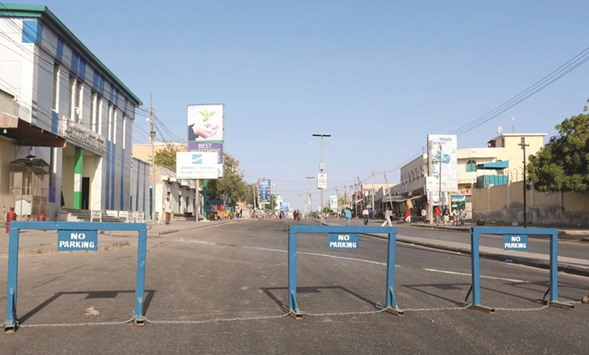Somali authorities blocked main roads in the capital and barred vehicles from driving near the secure airport compound yesterday in a security lock down before a presidential election.
After months of delays, 329 newly sworn-in members of parliament will choose today whether to back President Hassan Sheikh Mohamud for a second term or one of 21 rivals.
Rival candidates have accused each other of vote-buying, a practice in past votes Western donors have sought to stop.
Diplomats say that corruption continues to hamper efforts to rebuild after years of conflict, while the government is also battling an Islamist insurgency.
“Police forces will secure the election scene and streets, and the vote will take place peacefully as planned,” Mohamed Sheikh Hassan Haamud, Somalia’s police commander, told reporters in the capital, where pedestrians walked in quiet streets.
Heavily-armed security personnel patrolled the streets of the capital, while several main roads were blocked off with sand berms and residents of the capital were urged by Mayor Yusuf Hussein Jimale to stay indoors.
“My children did not go to school because of the election and my husband who works as a police officer had to stay on duty for the last three days. This thing is taking too long and people would be relieved if they could see an end to this drama,” mother-of-four Samiya Abdulkadir said.
Presidential candidates have promised to improve security and the economy.
Till now, a construction boom in the bombed out capital has yet to spread far across the rest of the nation, where a severe drought is threatening a new food crisis.
The airport in Mogadishu, secured by African peacekeeping force AMISOM and home to UN offices and foreign embassies, is the safest site in the capital.
The Shebaab, which once rule most of Somalia and wants to impose its strict interpretation of Islam on the nation, regularly launches attacks in Mogadishu but its area of control has been increasingly reduced to smaller pockets of countryside.
“All those involved in the election, directly or indirectly are apostates,” Shebaab spokesman Sheikh Ali Mohamud Rage told Reuters, saying that the group would take “tough measures” against those involved and accused foreigners of guiding the vote.
The government of the aid-dependent nation and its Western backers dropped an initial plan to give each adult a vote because of the challenge of securing national polling stations.
Instead, about 14,000 clan elders and regional figures chose the 275 members of the lower house of parliament and 54 members of senate.
Those lawmakers will pick the president today.
The system is a modest improvement on 2012, when just 135 elders picked parliament, which chose the president.
Experts said President Mohamud, who has had to fend off accusations by Western donors of corruption in his government, can rely on the loyalty of about one-third of the new lawmakers, giving him an edge but not a guarantee of victory.
“I really don’t care who becomes president. We just need to be free to attend to our business,” said Qoje Siyad, a Mogadishu day labourer.
Security sources said commercial flights would not be operating today.
No candidate is expected to get the two-thirds majority needed for a first-round win, with two further rounds permitted before a winner is declared.
In the absence of political parties, clan remains the organising principle of Somali politics.
The 22 candidates – all men after the only declared female candidates dropped out – paid a $30,000 (€28,000) registration fee.
Few have any serious chance of winning.
One of them is the current president, a 61-year-old former academic and civil society activist from the Hawiye clan.
Also in the running is ex-president Sharif Sheikh Ahmed, a fellow Hawiye and 52-year-old former leader of the Islamic Courts Union which pacified Somalia before being driven out by US-backed Ethiopian troops.
The leading candidates from the Darod clan are Prime Minister Omar Abdirashid Ali Sharmarke, 56, and former premier Mohamed Abdullahi Mohamed “Farmajo”, 55.
Both hold dual nationalities having lived for years in Canada and the US respectively.
Security and overcoming Somalia’s adversarial and divisive politics will top the agenda for whoever wins the vote as will dealing with a growing humanitarian crisis.
The UN warned last week of “possible famine” in Somalia as a severe drought has pushed nearly three million people to the edge of starvation.
After two failed rain seasons, aid workers fear a repeat of a 2010-11 drought which left more than 250,000 dead.

A general view shows a street which was blocked to control motor vehicle traffic, during a security lock down in Mogadishu.
